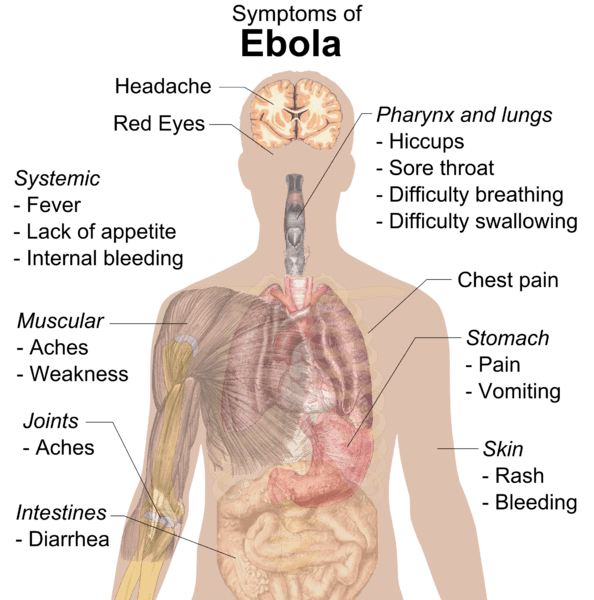Symptoms may appear anywhere from 2 to 21 days after exposure to Ebola, but the average is 8 to 10 days. Ebola Zaire kills people quickly, typically 7 to 14 days after symptoms appear. A person can have the virus but not show any symptoms for as long as 3 weeks. People who survive can still have the virus in their system for weeks afterward. The virus has been detected in semen up to 7 weeks after recovery, according to the WHO. Humans are not infectious until they develop symptoms. A person infected with Ebola virus will typically develop a fever, headache, joint and muscle pain, a sore throat, and intense muscle weakness.
Signs and Symptoms of Ebola Virus Disease are as follows:
- High fever (usually higher than 38.3 °C (100.9 °F))
- Muscle and Joint aches
- Headache
- Sore throat and Shortness of breath
- Chest pain and cough
- Red eyes
- Weakness
- Swelling
- Severe weight loss
- Chills
- Confusion
- Fatigue
- Nausea and Vomiting
- Diarrhea (may be bloody)
- Internal and External bleeding
- Bleeding, usually from the eyes
- Stomach Pain
- Hiccups
- Raised Rash
- Kidneys and Liver Failure
Recovery from Ebola depends on good supportive clinical care and the patient’s immune response. People who recover from Ebola infection develop antibodies that last for at least 10 years. Ebola virus disease is fatal in 50-90% of cases. The sooner a person is given care, the better the chances that they will survive.

Read Also:
Structure of Ebola Virus
Replication of Ebola Virus
Similar Posts:
- Zika Virus- Structure, Genome, Symptoms, Transmission, Pathogenesis, Diagnosis
- Hepatitis B Virus- Structure, Epidemiology, Symptoms, Pathogenesis, Diagnosis, Treatment and Vaccines
- Histoplasma Capsulatum – Habitat, Morphology, Epidemiology, Virulence Factors, Treatment + More
- Cryptococcus Neoformans – Habitat, Morphology, Epidemiology, Virulence Factors, Treatment + More
